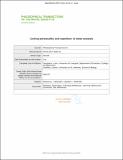Files in this item
Linking personality and cognition : a meta-analysis
Item metadata
| dc.contributor.author | Dougherty, Liam Robert | |
| dc.contributor.author | Guillette, Lauren Mary | |
| dc.date.accessioned | 2018-08-31T12:30:05Z | |
| dc.date.available | 2018-08-31T12:30:05Z | |
| dc.date.issued | 2018-09-26 | |
| dc.identifier | 254669995 | |
| dc.identifier | 4c709454-dc37-4d66-94cf-c48fdd2be135 | |
| dc.identifier | 85052535292 | |
| dc.identifier | 000441443800003 | |
| dc.identifier.citation | Dougherty , L R & Guillette , L M 2018 , ' Linking personality and cognition : a meta-analysis ' , Philosophical Transactions of the Royal Society. B, Biological Sciences , vol. 373 , no. 1756 , 20170282 . https://doi.org/10.1098/rstb.2017.0282 | en |
| dc.identifier.issn | 0962-8436 | |
| dc.identifier.uri | https://hdl.handle.net/10023/15921 | |
| dc.description | LMG Biotechnology and Biological Sciences Research Council Anniversary Future Leader Fellowship BB/M013944/1. LRD Association for the Study of Animal Behaviour Research Grant. | en |
| dc.description.abstract | In the past decade, several conceptual papers have linked variation in animal personality to variation in cognition, and recent years have seen a flood of empirical studies testing this link. However, these results have not been synthesized in a quantitative way. Here, we systematically search the literature and conduct a phylogenetically controlled meta-analysis of empirical papers that have tested the relationship between animal personality (exploration, boldness, activity, aggression and sociability) and cognition (initial learning/reversal speed, number of correct choices/errors after standard training). We find evidence for a small but significant relationship between variation in personality and variation in learning across species in the absolute scale; however, the direction of this relationship is highly variable and when both positive and negative effect sizes are considered, the average effect size does not differ significantly from zero. Importantly, this variation among studies is not explained by differences in personality or learning measure, or taxonomic grouping. Further, these results do not support current hypotheses suggesting that that fast-explorers are fast-learners or that slow-explorers perform better on tests of reversal learning. Rather, we find evidence that bold animals are faster learners, but only when boldness is measured in response to a predator (or simulated predator) and not when boldness is measured by exposure to a novel object (or novel food). Further, although only a small sub-sample of papers reported results separately for males and females, sex explained a significant amount of variation in effect size. These results, therefore, suggest that, while personality and learning are indeed related across a range of species, the direction of this relationship is highly variable. Thus further empirical work is needed to determine whether there are important moderators of this relationship. | |
| dc.format.extent | 12 | |
| dc.format.extent | 1239607 | |
| dc.language.iso | eng | |
| dc.relation.ispartof | Philosophical Transactions of the Royal Society. B, Biological Sciences | en |
| dc.subject | Behavioural Syndrome | en |
| dc.subject | Exploration | en |
| dc.subject | Individual differences | en |
| dc.subject | Learning | en |
| dc.subject | Sex differences | en |
| dc.subject | QH301 Biology | en |
| dc.subject.lcc | QH301 | en |
| dc.title | Linking personality and cognition : a meta-analysis | en |
| dc.type | Journal item | en |
| dc.contributor.sponsor | BBSRC | en |
| dc.contributor.institution | University of St Andrews. Centre for Social Learning & Cognitive Evolution | en |
| dc.contributor.institution | University of St Andrews. School of Biology | en |
| dc.identifier.doi | 10.1098/rstb.2017.0282 | |
| dc.description.status | Peer reviewed | en |
| dc.date.embargoedUntil | 2018-08-13 | |
| dc.identifier.grantnumber | BB/M013944/1 | en |
This item appears in the following Collection(s)
Items in the St Andrews Research Repository are protected by copyright, with all rights reserved, unless otherwise indicated.

